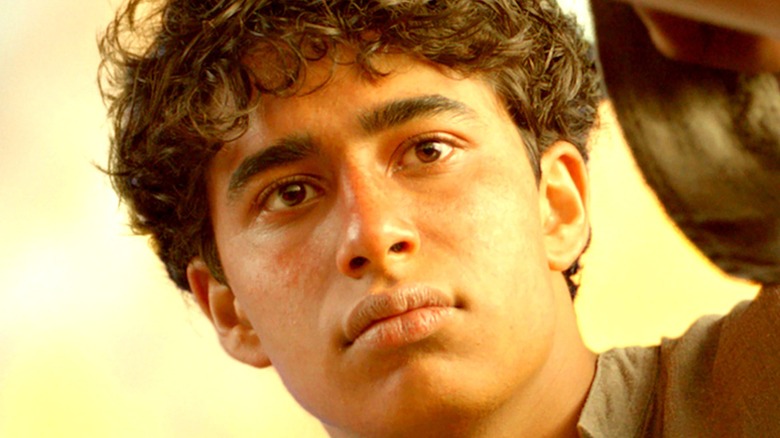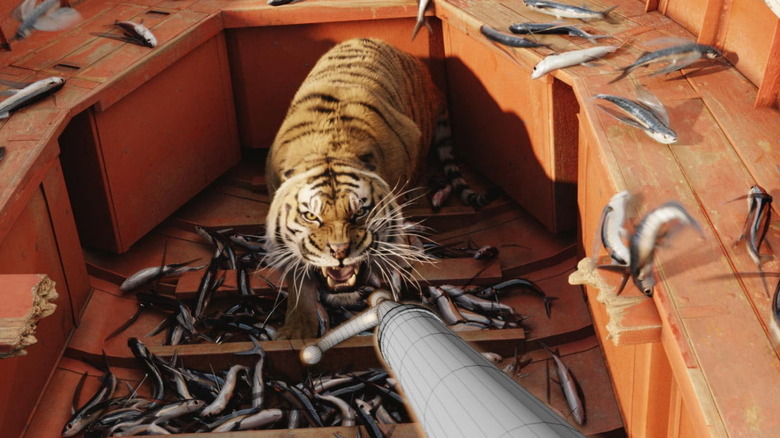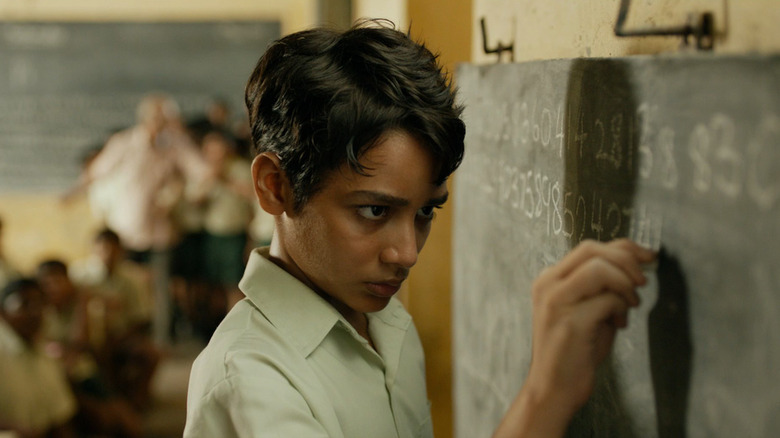This Is How The Life Of Pi Book Differs From The Movie
When Yann Martel's novel "Life of Pi" hit bookstores in 2001, it instantly generated buzz among readerly types, picking up accolades including the Man Booker Prize and the Asian/Pacific American Award for Literature (via The Canadian Encyclopedia). President Barack Obama later wrote the author a note to personally praise the book.
It was exactly the sort of publicity that would normally lead to a glossy Hollywood adaptation. Except that at the same time, everyone in Hollywood was certain that this book was "unfilmable" (via NOLA.com).
In case it's still in your to-read pile (or never even got that far), the novel version of "Life of Pi" takes a long time contemplating philosophy and religion before it even gets to the boy-and-tiger-on-boat scenario. A completely literal adaptation would mean many scenes of grown Pi (Irrfan Khan) pondering his theories on life to the reporter (Rafe Spall, who was actually a last-minute actor replacement.) Which some people probably would've enjoyed: Irrfan Khan, who died in 2020, was widely praised for his performance. But they wouldn't have outnumbered those who wanted to see the boy and tiger facing off on a boat.
However, not everyone was scared. Eventually, director Ang Lee — of "Crouching Tiger, Hidden Dragon" and "Brokeback Mountain" fame — teamed up with screenwriter David Magee (via IMDb), who had written the screenplays for another tricky book adaptation ("Miss Pettigrew Lives for a Day") and "Finding Neverland." It took 170 attempts over three-and-a-half years for Magee to come up with a draft Lee was satisfied with, per The Atlantic. Here's how the final movie differed from the book.
Richard Parker is a big reveal in the book
Towards the beginning of the book, when Pi refers to Richard Parker (King the tiger, per The Guardian), we don't initially know that he's a tiger. Which makes us wonder why Pi is so wary of him. It also foreshadows the alternative story Pi offers the insurance company agents, in which the various animals are actually different people.
In the movie, we meet Richard Parker while he's still in the zoo when Pi's father (Adil Hussain) feeds him a live goat to teach Pi that animals are not just furry humans. This happens in the book, but with a different tiger. Obviously, this choice was made to condense the story to fit into a movie timeframe, and it doesn't exactly ruin the surprise: we all came to see the movie about the boy and tiger surviving on a boat, so guessing that Richard Parker is the name of a tiger isn't that hard.
Speaking of the other animals, in the book, Pi spends at least several days trapped on the boat with the injured zebra, the pacing hyena, and the sad orangutan, Orange Juice, as well as Richard Parker. This is all condensed into about a day in the movie, again to save time.
Pi is more methodical in the book
As the previous mention of philosophy and religion indicate, the Pi in the book is a deep guy. His inquisitive spirit is more academic than the slightly mischievous character played wonderfully by Suraj Sharma. (In case you were wondering what happened to the actor who played Pi, Sharma has gone on to other roles.) Book Pi actively investigates and adopts three different religions — Hinduism, Islam, and Christianity — at the same time, defying the expectations of his parents and local religious leaders. The Pi of the movie also does this, but in a shorter timeframe, and he stumbles into them rather than seeking them out. Book Pi also doesn't have time for such lighthearted things as romance, whereas Pi in the movie falls in love with a dancer named Anandi (Shravanthi Sainath).
Book Pi's scholarly nature is also sidelined when it comes to his movie self's approach to Richard Parker. In the movie, Pi's attempts to tame Richard Parker are not particularly successful and seem to come out of nowhere. In the book, Pi is much more methodical, basing his attempts to assert dominance by drawing on his experiences growing up in his family's zoo. He also devotes a sizeable chunk of time to thinking of ways he might be able to kill the large, hungry predator he's sharing a lifeboat with.
Despite reservations that "Life of Pi" could never be made into a movie, the adaptation translated the beautiful, haunting story in a way that brought certain aspects to life that were muted on the page, even as it had to sacrifice others. You might prefer the movie's stunning visuals to the novel's philosophical discussions, or vice versa, but it's also fair to say they were both successful in their own respective ways.


